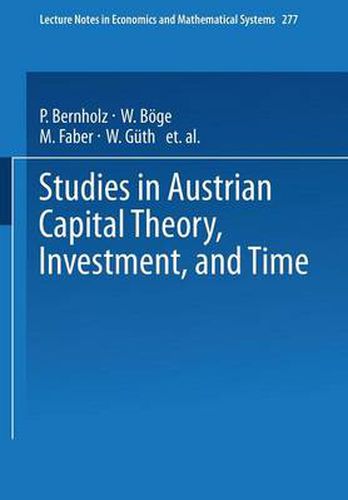Readings Newsletter
Become a Readings Member to make your shopping experience even easier.
Sign in or sign up for free!
You’re not far away from qualifying for FREE standard shipping within Australia
You’ve qualified for FREE standard shipping within Australia
The cart is loading…






This title is printed to order. This book may have been self-published. If so, we cannot guarantee the quality of the content. In the main most books will have gone through the editing process however some may not. We therefore suggest that you be aware of this before ordering this book. If in doubt check either the author or publisher’s details as we are unable to accept any returns unless they are faulty. Please contact us if you have any questions.
The neglect of time in general and of the time structure of production in particular in mainstream economics led to the rebirth of the Austrian tradition in the seventies. The names of BERNHCLZ, HICKS, KIRZNER and VON WEIZSACKER are representative of different approaches. In 1979 my Introduction to Modern Austrian Capital Theory appeared, in which I unified various papers BERNHOLZ and I had written. I also linked our approach to those of VON NEUMANN, of HICKS and of neoclassical capital theory. These Studies supplement and continue my Introduction in various ways. With all the authors of the present volume I have cooperated for several years. This volume is subdivided into five parts. The first one, Historical Perspectives, gives first an outline on the development of Austrian capital theory from its origins to the present. Next it relates Modern Austrian Capital Theory to SRAFFA’s theory and to the Austrian subjectivists’ pure time preference theory of interest. The latter theory is represented in its opposition to the traditional productivity-cum-time preference explanation of interest, which is. common t9 neoclassical and BOHM-BAWERKian capital theory alike. The Austrian subjectivist pure time preference theory has been misinterpreted in its recent presentation, which has led to misunderstandings. It is shown that there is no real contradiction between the two appoaches.
$9.00 standard shipping within Australia
FREE standard shipping within Australia for orders over $100.00
Express & International shipping calculated at checkout
This title is printed to order. This book may have been self-published. If so, we cannot guarantee the quality of the content. In the main most books will have gone through the editing process however some may not. We therefore suggest that you be aware of this before ordering this book. If in doubt check either the author or publisher’s details as we are unable to accept any returns unless they are faulty. Please contact us if you have any questions.
The neglect of time in general and of the time structure of production in particular in mainstream economics led to the rebirth of the Austrian tradition in the seventies. The names of BERNHCLZ, HICKS, KIRZNER and VON WEIZSACKER are representative of different approaches. In 1979 my Introduction to Modern Austrian Capital Theory appeared, in which I unified various papers BERNHOLZ and I had written. I also linked our approach to those of VON NEUMANN, of HICKS and of neoclassical capital theory. These Studies supplement and continue my Introduction in various ways. With all the authors of the present volume I have cooperated for several years. This volume is subdivided into five parts. The first one, Historical Perspectives, gives first an outline on the development of Austrian capital theory from its origins to the present. Next it relates Modern Austrian Capital Theory to SRAFFA’s theory and to the Austrian subjectivists’ pure time preference theory of interest. The latter theory is represented in its opposition to the traditional productivity-cum-time preference explanation of interest, which is. common t9 neoclassical and BOHM-BAWERKian capital theory alike. The Austrian subjectivist pure time preference theory has been misinterpreted in its recent presentation, which has led to misunderstandings. It is shown that there is no real contradiction between the two appoaches.